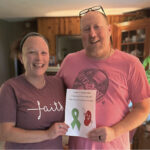 Now that it’s another new year, are you ready to quit tobacco?
Now that it’s another new year, are you ready to quit tobacco?
If so, there are plenty of local resources to help you on what many say is a difficult, yet rewarding, journey to a tobacco-free life.
If you do quit, you certainly won’t be alone. The Centers for Disease Control and Prevention recently reported that the number of U.S. adults who smoke cigarettes declined by nearly 20 percent from 2005 to 2014.
Federal officials speculated that anti-smoking campaigns, better insurance coverage to help quitters, and tougher laws that make it harder to smoke in certain places contributed to the decline, as well as stiffer federal and state taxes on tobacco products.
“Everyone already knows using tobacco is not good for you,” said Kristen Ruis, a tobacco cessation counselor at Sadler Health Center in Carlisle. “What people need for quitting is information about how the addiction process works, and they need support.”
Here are several resources for tobacco cessation help that are right here in our area.
PinnacleHealth
PinnacleHealth sponsors a free monthly cessation support group facilitated by a certified tobacco treatment specialist at Giant Food’s Community Center in Camp Hill, as well as smoking cessation services at PinnacleHealth CARES and Community Wellness in Harrisburg.
“The whole goal behind this is to build an external support system,” said Shannon Mason, RN, a tobacco treatment specialist. “The hardest part of quitting tobacco is coping with stress. There’s different reasons why every person uses tobacco, but the most common is using it as a stress reliever.”
Mason said that support group numbers fluctuate from month to month but usually average around five people. Roughly half are smokers; the others are chewers. The youngest attendees are college students. The oldest was a 76-year-old woman who quit with the aid of nicotine replacement patches after 62 years of tobacco use, she said.
“When she first came to our group, she wanted to quit tobacco but liked it,” Mason stated. “It was six months before she quit. In November, she was eight weeks tobacco-free.”
Quit methods are “very individual,” but Mason said she doesn’t like anyone going cold turkey. She also doesn’t consider e-cigarettes a cessation aid.
“They’re not regulated by the FDA. They don’t have to answer to anyone,” she stressed.
Mason said she became interested in tobacco cessation counseling through her work as a registered nurse.
“I saw some (medical) complications that came from bad lifestyle decisions,” she said. “Tobacco use is the number-one preventable cause of death. That’s the word that got me. It’s preventable.”
For information on PinnacleHealth’s tobacco cessation services, visit www.pinnaclehealth.org, call 717-231-8014 or email Mason at smason@pinnaclehealth.org.
Northern Dauphin County YMCA
The Northern Dauphin County YMCA is a designated provider of the American Lung Association’s “Freedom From Smoking” cessation program in south-central Pennsylvania. This covers Dauphin, Cumberland, Perry, Bedford and Blair counties.
“Freedom From Smoking,” a free eight-week program conducted at the Northern Dauphin YMCA or upon request, will go to workplaces, human service agencies or addiction rehab and mental health facilities. The program can be modified for groups or one-on-one settings and provides participants with a month’s supply of nicotine replacement aides.
“The program can be for all different sized groups,” said Eric Rothermel, outreach director for the Northern Dauphin branch. “We’ll go anywhere.”
Funding for “Freedom From Smoking” is provided by the Pennsylvania Department of Health through the American Lung Association of the Mid-Atlantic.
“Each session is more about gaining control over the behavior of tobacco use,” Rothermel said. “‘Quit Day’ happens during session four. The hardest part is the behavior for adults. They taught themselves to do this all these years. You’ve just got to jump in with both feet. If you have a setback, you just try again.”
About 60 percent of all participants report quitting by the end of the program, noted Jen Hobbs Folkenroth of the American Lung Association in Camp Hill. It takes the average smoker 11 tries to quit for good using any method, she added.
Out of 10 participants, about three or four remain tobacco-free after six months, Rothermel said. He strongly urged smokers not to use cold turkey methods, as those have a success rate of less than 10 percent.
For the “Freedom from Smoking” program, the Northern Dauphin YMCA works in collaboration with the West Shore YMCA in Camp Hill and the Hollidaysburg Area YMCA in Blair County.
The Northern Dauphin branch also collaborates with the Dauphin County Office of Juvenile Probation, providing tobacco prevention courses to youth enrolled in the Dauphin County Young Offenders Program.
The Northern Dauphin YMCA is located at 500 N. Church St., Elizabethville. For information, call 717-362-9494 or visit www.ymcaharrisburg.org/northerndauphin.
Sadler Health Center
The Sadler Health Center in Carlisle offers individual tobacco cessation counseling. As a federally qualified health center, Sadler’s fees are based on a sliding income scale or covered by insurance when applicable.
“A person doesn’t have to be ready to stop smoking to come here,” said tobacco cessation counselor Kristen Ruis. “We encourage people just to come in and talk to someone. A person may want to quit smoking, but the brain does not want them to quit.”
Addiction to tobacco is stronger than to cocaine, heroin or alcohol, Ruis said. Once consumed, nicotine can travel to the brain in about seven seconds, providing users with a deep level of instant gratification.
“Most start using in their teens before they really know how it’s going to affect the rest of their lives,” Ruis said. “I’ve seen older people with COPD, use oxygen or have trouble just breathing, and they’re still addicted to tobacco.”
Studies indicate that behavioral therapy paired with nicotine replacement aides are an effective way to quit, said Ruis, who also has served as a behavioral health specialist at Sadler. Going cold turkey is not recommended.
“The hardest part about quitting is the tobacco cravings,” Ruis explained. “Nicotine replacement therapy helps to calm those. Also, tobacco use is such an invasive part of your day, your brain associates certain behaviors with nicotine. For instance, maybe you always smoked when driving your car or with meals.”
Sadler Health Center is located at 100 N. Hanover St., Carlisle. For more information about Sadler’s tobacco cessation program, call 717-218-6670; email info@sadlerhealth.org; or visit www.sadlerhealth.org.
Lancaster General Health
Lancaster General Health offers one-on-one tobacco counseling and “Freedom From Smoking” group classes free to all participants. These programs are provided through the Southeastern Pennsylvania Tobacco Control Project, a program of the Health Promotion Council, and funded through a grant from the Pennsylvania Department of Health.
Mary LeVasseur, manager of community health at Lancaster General, said that about 250 individuals take advantage of the facility’s smoking cessation services each year. Their success rate, she said, “Really depends on medication. The most successful people are on medication to do this.”
Most insurance programs cover “some form” of cessation medication, LeVasseur said, which may include Chantix, Wellbutrin or nicotine patches, gum or lozenges.
“Seventy percent of the people say they want to quit but they have a lot of anxiety about putting that first cigarette down,” LeVasseur stated. “You don’t have to quit to come to our classes.”
As a former smoker, LeVasseur knows what it’s like to quit. She also knows that the most important component is “finding a counselor who will work with you on this journey to become tobacco-free.”
For more information, call 1-888-544-4636 or visit www.LGHealth.org/Classes. Also visit www.facebook.com/whytobaccofreelanc.
Other Quit Tobacco Resources
PA Quitline: Free phone counseling and nicotine replacement therapy, 1-800-784-8669.
Smokefree TXT: Text the word QUIT to IQUIT (47848) from your mobile phone.
Wellness Connection: Webcam counseling and nicotine replacement therapy, 1-800-200-2229.
PA Dept. of Health: www.determinedtoquit.com.
American Lung Association of Pennsylvania: Certified tobacco cessation specialists available face-to-face, by phone, online or through self-help guide. Call 1-800-LUNGUSA.





